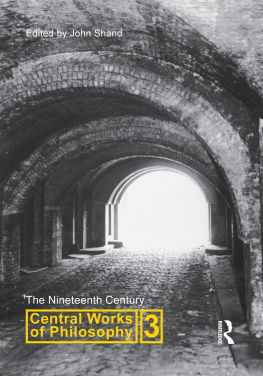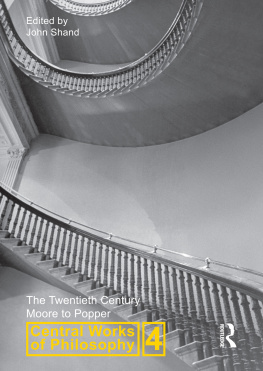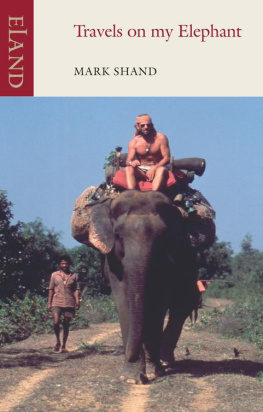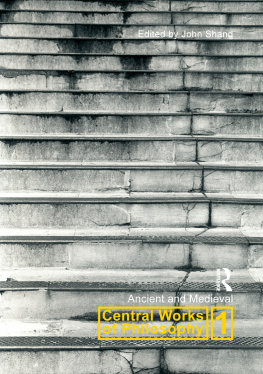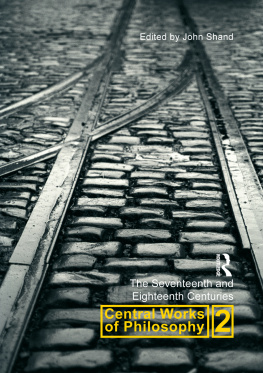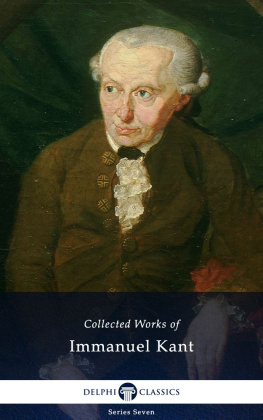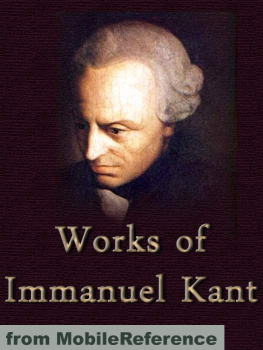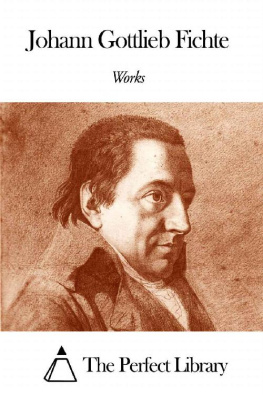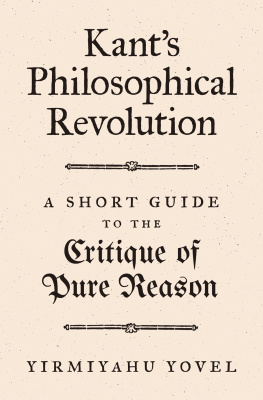Central Works of Philosophy
Central Works of Philosophy is a multi-volume set of essays on the core texts of the Western philosophical tradition. From Platos Republic to the present day, the volumes range over 2,500 years of philosophical writing covering the best, most representative, and most influential work of some of our greatest philosophers. Each essay has been specially commissioned and provides an overview of the work and clear and authoritative exposition of its central ideas. Together these essays introduce the masterpieces of the Western philosophical canon and provide an unrivalled companion for reading and studying philosophy.
Central Works of Philosophy
Edited by John Shand
Volume 1: Ancient and Medieval
Volume 2: The Seventeenth and Eighteenth Centuries
Volume 3: The Nineteenth Century
Volume 4: The Twentieth Century: Moore to Popper
Volume 5: The Twentieth Century: Quine and After
Central Works of Philosophy Volume 3
The Nineteenth Century
Edited by John Shand
In memory of my parents, Alexander Hesketh Shand and Muriel Olive Shand
First published in 2005 by Acumen
Published 2014 by Routledge
2 Park Square, Milton Park, Abingdon, Oxon OX14 4RN
711 Third Avenue, New York, NY 10017, USA
Routledge is an imprint of the Taylor & Francis Group, an informa business
Editorial matter and selection, 2005 John Shand. Individual contributions, the contributors.
This book is copyright under the Berne Convention.
No reproduction without permission.
All rights reserved. No part of this book may be reprinted or reproduced or utilised in any form or by any electronic, mechanical, or other means, now known or hereafter invented, including photocopying and recording, or in any information storage or retrieval system, without permission in writing from the publishers.
Notices
Practitioners and researchers must always rely on their own experience and knowledge in evaluating and using any information, methods, compounds, or experiments described herein. In using such information or methods they should be mindful of their own safety and the safety of others, including parties for whom they have a professional responsibility.
To the fullest extent of the law, neither the Publisher nor the authors, contributors, or editors, assume any liability for any injury and/or damage to persons or property as a matter of products liability, negligence or otherwise, or from any use or operation of any methods, products, instructions, or ideas contained in the material herein.
ISBN 13: 978-1-84465-016-3 (hbk)
ISBN 13: 978-1-84465-017-0 (pbk)
British Library Cataloguing-in-Publication Data
A catalogue record for this book is available from the British Library.
Designed and typeset in Garamond by Kate Williams, Swansea.
Contents
| John Shand |
| Michelle Grier |
| Curtis Bowman |
| Michael Inwood |
| Dale Jacquette |
| Jonathan Riley |
| C. Stephen Evans |
| Tom Rockmore |
| Rex Welshon |
Curtis Bowman has published articles on Kant, Fichte, Husserl, Heidegger, and Derrida, and is one of the translators of Notes and Fragments , volume 13 of the Cambridge Edition of the Works of Immanuel Kant. He has taught at the University of Pennsylvania, Bryn Mawr College, and Haverford College.
C. Stephen Evans is University Professor of Philosophy and Humanities at Baylor University, Texas and has also taught at Calvin College, Michigan and St. Olaf College, Minnesota. He is the author of many articles and fifteen books, including, most recently, Kierkegaards Ethic of Love .
Michelle Grier is Professor of Philosophy at the University of San Diego. In addition to numerous articles on Kants philosophy, she is the author of Kants Doctrine of Transcendental Illusion .
Michael Inwood has taught philosophy at Trinity College, Oxford since 1967. Besides his publications on Hegel, he is also the author of Heidegger and A Heidegger Dictionary . He has also written on Plato and Aristotle, and is particularly interested in the relationship between Greek and German philosophy.
Dale Jacquette is Professor of Philosophy at The Pennsylvania State University. He is the author of The Philosophy of Schopenhauer (Acumen) and editor of Schopenhauer, Philosophy, and the Arts .
Jonathan Riley is Professor of Philosophy at Tulane University, New Orleans, and editor of Politics, Philosophy and Economics . His most recent book is Mills Radical Liberalism .
Tom Rockmore is Professor of Philosophy at Duquesne University, Pittsburgh. He is the author of many books concerned with different thinkers and themes from modern European philosophy.
John Shand is an Associate Lecturer in Philosophy at the Open University and is the author of Philosophy and Philosophers: An Introduction to Western Philosophy (second edition Acumen) and Arguing Well and editor of Fundamentals of Philosophy .
Rex Welshon is Associate Professor of Philosophy, Chair of the Department of Philosophy, and Associate Dean of the College of Letters, Arts, and Sciences at the University of Colorado at Colorado Springs. His primary research interests are in the philosophy of mind and the philosophy of Nietzsche. He is the author of The Philosophy of Nietzsche (Acumen).
The works in the Central Works of Philosophy volumes have been chosen because of their fundamental importance in the history of philosophy and for the development of human thought. Other works might have been chosen; however, the underlying idea is that if any works should be chosen, then these certainly should be. In the cases where the work is a philosophers magnum opus the essay on it gives an excellent overview of the philosophers thought.
by Michelle Grier introduces Kants Critique of Pure Reason . Few works have been more influential in philosophy. Kants transcendental idealism attempted to set the limits of what could be known within the bounds of possible experiences (phenomena). In this way he could give grounds, contra empiricism, as to why the basic assumptions of science such as causality applied to the world, and why, contra rationalism, we should refrain from metaphysical speculation concerning things-in-themselves (noumena) things as they are independently of how they can appear to us where no experience could possibly settle the problems raised. We know that the world will conform to our basic conceptual categories for understanding it because those categories are the structure of any possible experience imposed by the mind as a condition for having those experiences, and the world just is the sum of possible experiences, if it is anything at all to us. He aimed also to leave a realm beyond science, beyond phenomenal experience, that would provide room for moral responsibility and faith in God.
rectify two main defects in Kants philosophy. The first is the problematic notion of things-in-themselves, necessarily unknowable, but in some sense existing beyond how things appear to us. The second is the link of theoretical and practical reason, left unconnected in Kant. In Fichte theoretical reason cannot be understood in separation from its practical engagement with the world; the world is a soundingboard for our moral endeavours. Fichtes solution to the first defect starts by examining the pure I or ego. The I is not a thing, but exists in virtue of the self-creating normative activity of positing itself a self-positing I, where the self-positing activity is the very essence of the I and in so doing it must limit itself by positing a non-I, something not itself. When it is viewed through the categories principally, space, time and causality the thing-in-itself is what we call the external world. He goes further than Kant and holds that the thing-in-itself cannot even be thought about, let alone known. The I encounters a block at the limits of thought, and that gets posited as the thing-in-itself.

